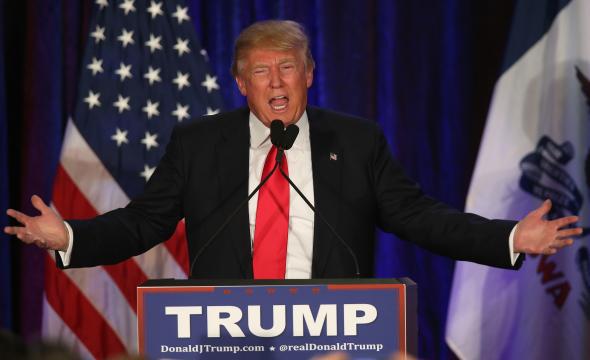Yesterday, in a story about Donald Trump and Christian conservatives, I wrote, “The outcome of this year’s Iowa caucus may tell us if the American religious right has retained its outsize influence in American politics or if a new populist force has supplanted it.” Now, Iowa voters have told us. A record-breaking number of Republicans—over 180,000, compared to 121,503 in 2012—caucused last night. Contrary to expectations, many of them came not to support Trump, but to stop him. According to the Washington Post, 64 percent of caucus-goers were evangelicals. A third of them went for Cruz, compared to a little more than 20 percent for Trump. Conservative Christians gave Cruz his victory over the brash Manhattan vulgarian.
It turns out that the two things that have always mattered in Iowa Republican politics—faith and an intensive grassroots operation—still do. Throughout this surreal political season, many of us have wondered if Trump’s impersonal, spectacle-driven campaign, built on mass rallies and media exposure rather than one-to-one connection with voters, would actually motivate people to get out and caucus. The answer, actually, is yes. Trump got more votes than either of the last two winners of the Iowa Caucuses: 45,416, compared to 29,839 for Rick Santorum in 2012 and 40,841 for Mike Huckabee in 2008. But Cruz’s religious-right mobilization and sophisticated voter targeting still won out.
In the week before the caucuses, both local and national leaders of the religious right got serious about heading Trump off. Bob Vander Plaats—head of the FAMiLY Leader, and Iowa’s most powerful evangelical—campaigned hard for Cruz. (Vander Plaats has now endorsed all of the past three winners of the GOP Iowa Caucus.) Leading female anti-abortion activists wrote an open letter urging Iowans to support anyone but Trump. A 17,000-strong coalition, Pro-Lifers for Cruz, unveiled itself, with the Family Research Council’s Tony Perkins as its chairman. One of the co-chairs, Troy Newman, is a board member of the Center for Medical Progress, the group behind last year’s Planned Parenthood video sting; Newman has argued that the murder of physicians who perform abortions is legally justifiable.
Besides mobilizing a zealous movement, Cruz also ran the sort of detailed digital operation that propelled Barack Obama to victory in the 2008 Democratic Iowa caucuses. Cruz’s campaign, Bloomberg reported, “divided voters by faction, self-identified ideology, religious belief, personality type—creating 150 different clusters of Iowa caucus-goers—down to sixty Iowa Republicans its statistical models showed as likely to share Cruz’s desire to end a state ban on fireworks sales.” Trump did nothing comparable. Politico reported that his campaign spent significantly more on hats—at least $1.2 million—than on field staff or analytics.
Now that Trump is a loser, it’s anyone’s guess whether his support in New Hampshire and other early voting states falls away. Perhaps some sort of psychic bubble will burst, and would-be backers nationwide will realize that Trump is not an unbeatable übermensch bringing national salvation but rather a cynical, peevish showman. We should not, however, discount the enduring power of the alienated, angry nationalists who rallied to Trump’s banner. They turned out in historically high numbers last night, despite a campaign that couldn’t be bothered to put together even a rudimentary field operation. In states where primary voting is easier and evangelicals don’t predominate, those voters might still put Trump over the top. If they don’t, it’s just a matter of time until someone comes along who speaks to their passions and knows how to organize them. Imagine what would have happened if, instead of breaking all the rules of Iowa campaigning, Trump had bothered to master them.
Read more Slate coverage of the GOP primary.
